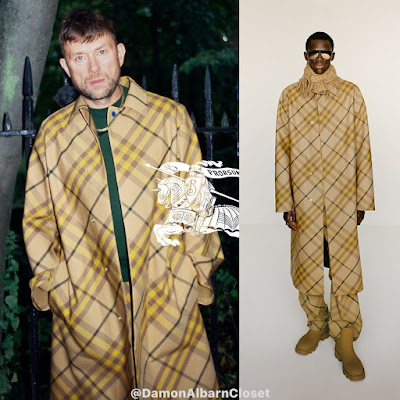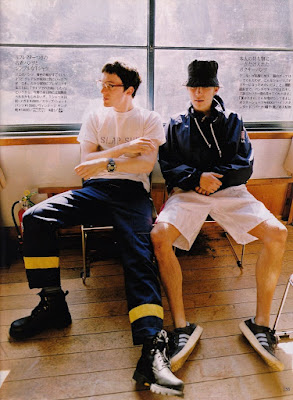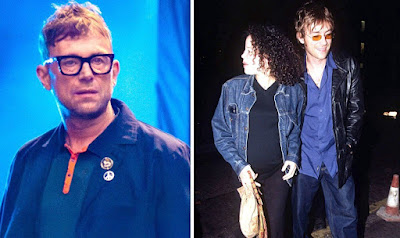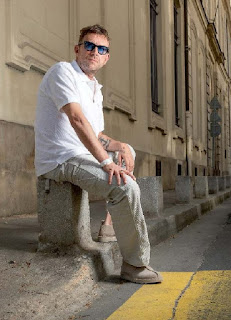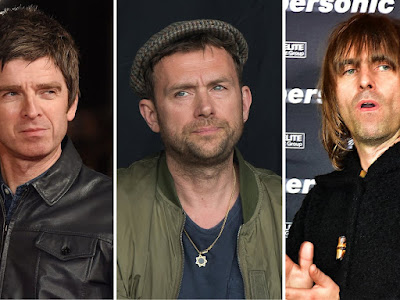THE OTHER KING OF POP
At 55, the musician meets with his comrades of Blur again and delivers a splendid new album. An encounter with the most charming of Englishmen.
Interview Benjamin Locoge / Photos Éric Garault
This Sunday, May 28. Newcastle is in turmoil. In the middle of a bank holiday, the city center has become a lawless zone where alcohol flows freely. Blur played that night in a club in the austere city of the United Kingdom, two months before the release of their new album and six weeks before two concerts at Wembley Stadium, London. For two hours, the quartet scrolls through the soundtrack of the past thirty years with mad intensity. Because, from 1991 to 2003, Blur was, along with Oasis, the best of the World Pop scene. Smart hits, in the line of Kinks, anthems for stadium (“Song 2”) and splendid ballads to end the song. Then everything went off rails, and Damon Albarn needed to try other things: the Gorillaz project in 2000 – his greatest success – the group The Good, the Bad and the Queen with Tony Allen and Paul Simonon, an album with Malian musicians, “Mali Music”, albums under his name, but also operas for the Châtelet, in Paris, or this year production: the magnificent “London Ko” by Fatoumata Diawara. In general, everything Albarn touches turns to gold, and the old adage is repeated with ‘The Ballad of Darren’, Blur’s totally unexpected ninth album. We find the mastermind of the quartet ten days later, in Paris. Smiling, pleasant, melancholic. And totally honest.
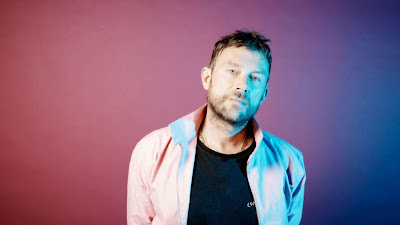
Paris Match. You announced a tour with Blur and then a new album. Did it happen in that order since you were going on tour and you needed new songs?
Damon Albarn: Initially, there was none of that in my head. No album, no concert. I was on tour in the US with Gorillaz and when I’m on the road I always bring a little studio with me. I started writing there and I was like, “Um, maybe, maybe…” So I kept composing and I presented about twenty songs to the members of Blur last January. And here we are with “The Ballad of Darren”.
How are you doing? The record talks about complicated loves, break-ups, and people who move away. Looks like life hasn’t spared you…
Yes, it’s true. The last few months, the last year has not been easy… But the music allows me to “bring out” all that… [He smiles.] That is to say, it’s the only way I know to overcome this sort of event. And it’s cheaper than therapy.
Do you really feel better after singing your pain?
Yes. Yes, of course. But I will be able to ascertain it to you when I have performed the whole album in front of an audience. The whole record is not dark, there is still, it seems to me, a small light at the end. If there wasn’t at least that to guide us, what was the point? Life has taught me that even the worst storms come to an end. That’s what I sing about for example in “Avalon”: What is the point of building Avalon, when you can’t be happy when it’s done.
Is it because of music that your personal life is in shambles?
The two have to be linked somehow… But I wouldn’t say my personal life is in shambles, nor would I say it’s unconventional. Like many people, I have a complicated private life and, at the same time, I am lucky to be able to present an artistic entity that can speak to the greatest number. That being said, I don’t want to break down everything I say on this album, the songs speak so much for themselves… [Laughs.]
You had already released a break-up album, “13”, in 1999…
Yes, it’s true. It was another relationship that had ended, but in the end it was the same cataclysm that hit me… I hope not to experience this a third time… When I was a kid, my mother had fun terrifying me by telling me: “You never know what’s around the corner.” And I always took her words literally. This is what allowed me to move forward, not to settle into a certain idiotic comfort. But I wake up every morning not really sure what fate will hold for me..
To get through these trials of life, you went back to your old band and your oldest accomplices…
Yes, Blur is the closest thing I have to a mantra. When we go on stage together these days, it inevitably reminds me of us as teenagers, young adults in 1992-1993. We kept that energy while adding more emotions…
Why did you start Blur with Graham Coxon in 1988?
Graham and I met at Stanway Comprehensive School, a school for students who struggled in more reputable schools, where standards were a little lower. But I was lucky to grow up in the artistic world, my father ran the Art School of Colchester, my mother was an artist… At school, I was perceived as the “different” boy, because I was probably really different from the others. My culture, my references were not the same as the children my age. Graham’s father was a musician in the British army, so he was musically inclined but less artistically inclined than me. And it was our common interest in music that brought us together.
Do you remember your first interactions with him?
Oh no! We wrote a first song together, “Sing”, without even having the idea that we could release it, get signed, or record an album. We were like all young adults, just living in the moment. But we were offered a contract after only five concerts, it worked like that at the time. [He laughs.] And the adventure was launched…
Thirty years later, what do you think of your first album?
I wish I had more confidence in my writing abilities. The texts seem to me a bit confused, lacking structure. But there are good things: Sing is a song that we still play. And I like the energy that comes out of this album, which is more of a Graham record, I must admit.
You reverse the trend with “Modern Life Is Rubbish”, your gargantuan second album…
Yes, I am claiming here that I am a songwriter. I don’t know if I really had confidence in myself then, but we had done an American tour which had turned into a nightmare. We played in total indifference or in almost empty venues. And that sparked something in me. [He laughs.] I was 22 years old, angry, disappointed, lost and frustrated…I had to do something about those negative feelings. And I chose to write about them. I’ve always had that mindset…
From 1993 to 1999, you will experience the most beautiful adventure of Britpop since the Beatles. What do you make of this, in hindsight?
I became obsessed. I still am, it’s my human condition. Each success obliges you, finally forces me to seek how to grow, how to surprise. I still have the feeling, at 55, of having to prove something. Because when you’ve landed a number 1, you want another, and then another. Until the day when you no longer correspond to the standards of the time. In the early 1990s, we were young, we were new, we looked good. And society could project itself into us. We embodied something positive, and that suited us well. The danger would have been to believe that people found themselves in us. But it was in the era that they found themselves, in this period that we were going through together. Because, at some point, someone else comes along and attracts all the light.
The album “Blur”, in 1997, was already stepping aside…
Graham couldn’t stand the very nature of Britpop anymore, he needed to look elsewhere. I agreed with him. I couldn’t write about “dirty pigeons” all my life anyway… So we switched to heroin! [He laughs.] It worked until I became a father. There I understood that the two were incompatible: having a family while on drugs was not possible. And I do not recommend it to anyone…
Was it an act of courage to go against the movement that had thrown you under the spotlight?
I don’t think courage had anything to do with our approach then. It’s just the music we wanted to make. We had no loan, no children, no stable relationships, we could afford to try things. We spent a lot of time in Iceland, in particular, we recorded “Song 2” in a very small studio in Reykjavik, and it became a gift from heaven for us. This song is probably playing somewhere in the world as we speak. It’s been used for commercials for twenty five years… It’s totally crazy and honestly we could never release anything, never make music again and still live off the rights that “Song 2” earns us. This one little song could allow us to never have to work again.
In the early 2000s, Blur collapsed and you released Gorillaz, a huge success…
Blur did not crumble. Graham left because his own life was falling apart. It took him years to figure out who he was, to get back on track.
THE BRITPOP IN TWO ALBUMS: “PARKLIFE” AND “THE GREAT ESCAPE”
“The main reason I wanted to play Blur again was to be able to sing ‘Parklife.’ There is something very optimistic in this song, ”says Damon Albarn. Released in 1994, the album of the same name is a great album of “guitar pop”, written with humor and notably including the hit “Girls and Boys”. A year later, when Oasis was at its peak , Blur did it again with “The Great Escape”, offering a hit, “Country House”, and an anthem, “The Universal”. Nearly thirty years later, these two masterpieces show a facet of the England we love: jubilant, smiling, melancholic, energetic and smart. “It’s a record written too quickly,” says Albarn, because we were playing to be known at night while wanting to work during the day. But the result is not so bad. »
Have you been a helping friend to him during this period?
I helped him by saying, “I’m not working with you anymore until you fix yourself.” I couldn’t deal with his unstable behavior anymore, I was happy that our relationship was finally over, it had become far too toxic for him and for me. But our story has demonstrated that it was much stronger than this incident. Because we are still here. And above all, Graham is a happy man now, much more at ease with life as a whole. He went through so many dark episodes…
Your drummer, Dave Rowntree, and bassist, Alex James,do they have a say in Blur?
Of course. But Blur is above all Graham and me. Careful, I do not want to minimize their role within the band, but they have lives outside. Alex has five children, he makes cheese, writes columns in the press, organizes a festival. Dave has a degree in astronomy, he knows how to fly a plane, he had political responsibilities within Labour, he could even be elected to Parliament one day. Me, I only composed and wrote songs!
In your mind, Blur never broke up and then reformed?
What is the point of this kind of final sentence? This allowed us to never make a comeback. We are not always available at the same time, we are all doing things on our side, we are busy. And, when we feel like it, we play at Wembley Stadium…
What makes you happy?
Being able not to do the same thing all the time. I couldn’t follow up with a huge tour, another Blur album. I know that we have concerts planned until the end of 2023, and then I have to work on the opera that I am producing with Jean-Luc Choplin in Paris, “The Curse”, the sequel, in all modesty, to “The Magic Flute! ”
You now sing songs written more than thirty years ago, which we blamed the rock dinosaurs when you were just starting in the music industry.
Yes, I am fully aware of that. [He laughs.] It makes me laugh to reread what I wrote in “End of a Century”: “The mind gets dirty when you get closer to thirty”, or in “Tracy Jacks”: “He’s getting past forty and all the seams are splitting”. It was projections towards an age that seemed far away, unimaginable… I merrily passed it, but it was worth it.
Interview by Benjamin Locoge
Source



